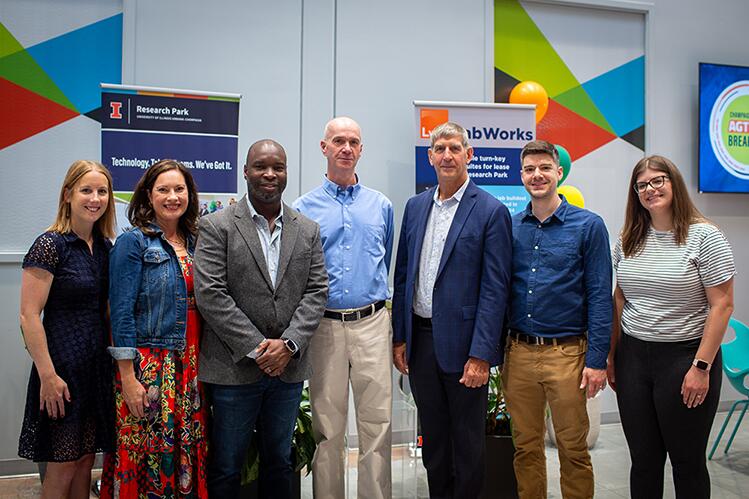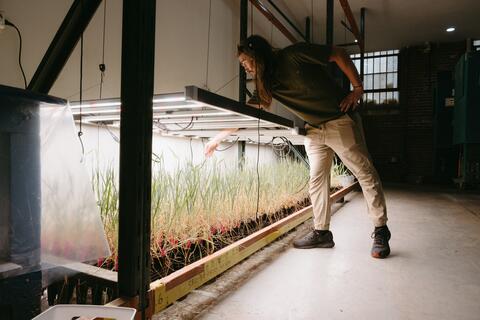iFAB Tech Hub catalyzes ‘agricultural biologicals’ innovations through growing partnerships

Today, MicroMGx celebrates the opening of its new research facility at the University of Illinois Research Park, part of the Illinois Fermentation and Agriculture Biomanufacturing (iFAB) Tech Hub, which is a testament to rapid advancements and increasing investment to realize agricultural innovations through precision fermentation.
With a $51 million grant from the Economic Development Administration, iFAB is positioning Central Illinois as the epicenter of biomanufacturing through precision fermentation — and also the heart of the growing agricultural biologicals market, which is projected to reach $31.8 billion by 2029.
"At iFAB, we are building a robust ecosystem that supports the development of sustainable agricultural inputs. Central Illinois is home to industry leaders, innovative startups, world-class R&D, scalable infrastructure, abundant feedstock production, and robust transportation networks—all of which contribute to our mission,” said Beth Conerty, who leads the iFAB consortium and business development for the Integrated Bioprocessing Research Laboratory, part of the Department of Agricultural and Biological Engineering in the College of Agricultural, Consumer and Environmental Sciences and The Grainger College of Engineering at Illinois.
“By transforming corn and soybeans into bio-based agricultural chemicals, we are helping to create a circular bioeconomy that benefits producers, consumers, and the planet,” Conerty added.
MicroMGx — Naturally produced herbicides
The Champaign-based startup MicroMGx is harnessing the bacteria responsible for onion center rot to develop a novel broad-spectrum herbicide with a new-to-the-industry mechanism of action, critical for beating herbicide resistance in weeds. For the past 18 months, MicroMGx has been scaling its technology in partnership with IBRL, which is a key member of the iFAB consortium outfitted with pilot-scale fermenters from 20 to 1,500 liters.
“Through our collaboration with IBRL, we’re able to scale our microbial discoveries into viable agricultural products that could revolutionize weed management,” said MicroMGx cofounder William Metcalf, also a professor of molecular and cellular biology at the U. of I. “The opening of our new facility at Research Park’s LabWorks is a significant step in bringing these innovations to market.”
Earnest Agriculture — Field testing a probiotic revolution

Earnest Agriculture, an ag startup based in Rantoul, Illinois, is harnessing precision fermentation to develop a next-generation probiotic seed coating. Tailored for field crop producers, these microbe-based coatings protect crops against diseases and improve nutrient use and resilience, all while improving soil health. This summer, Earnest Agriculture completed its second-year field trials to assess the product’s effectiveness in sustainably boosting crop yields.
Earnest Agriculture has deep roots in the Urbana campus, having emerged from the U. of I. iVenture Startup program. The company placed in the Cozad New Venture Competition and won the Edwin Moore Award.
“Our strong partnerships with the University of Illinois continue as we collaborate with the College of ACES to conduct field trials in partnership with the Department of Crop Sciences and work with IBRL to scale our probiotic seed coating technology,” said CEO of Earnest Agriculture Eddy Mejia, who is an Illinois alumnus. “As our trials expand and interest in our product grows, the need to scale up production becomes critical. With IBRL’s advanced fermenters, we’ll be able to bring our innovations to market and ensure that farmers can benefit from this sustainable technology.”
FrostDefense Envirotech Inc. — Protecting vineyards from frost
FrostDefense Envirotech Inc., another ag startup based at Research Park, is developing a sprayable solution that prevents frost damage in vineyards. This eco-friendly, low-cost alternative to traditional methods is being advanced toward commercial readiness with support from IBRL.
“Frost is a significant challenge for vineyard owners, and our collaboration with IBRL is helping us refine an environmentally friendly solution that not only mitigates frost damage but also aligns with sustainable agricultural practices,” said FrostDefense president and cofounder Manfredo Jose Seufferheld, also a visiting professor at Illinois.
iFAB: A catalyst for sustainable agricultural innovations
These pioneering startups highlight how iFAB is partnering with companies to develop and commercialize bio-based agricultural solutions, Conerty said. “As more innovative enterprises choose to partner with iFAB, Central Illinois is establishing itself as a leading hub for sustainable biomanufacturing. We’re excited to welcome additional companies to join this growing ecosystem.”
For more information on how to kickstart your precision fermentation project, contact Beth Conerty at bconerty@illinois.edu.
About iFAB
The Illinois Fermentation and Agriculture Biomanufacturing (iFAB) Tech Hub is poised to become the global leader in precision fermentation and biomanufacturing — an industry expected to grow to $200 billion over the next 15 years. Leveraging biology as a manufacturing technology of the future, iFAB is uniquely uniting world-class R&D, industry leaders, innovative startups, scalable infrastructure, abundant feedstock production, unparalleled transportation networks, and strong relationships with corn and soybean suppliers within a 51-mile radius. This unique lab-to-line approach establishes the iFAB region (Champaign, Piatt, and Macon counties) as the preeminent destination for the biomanufacturing industry.